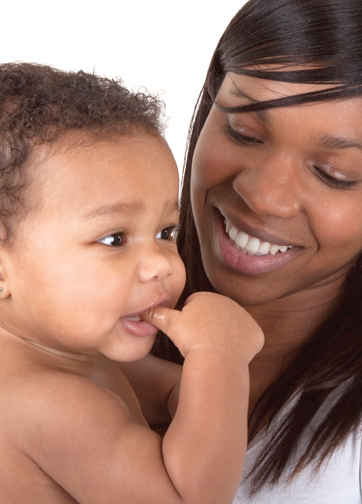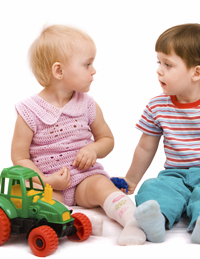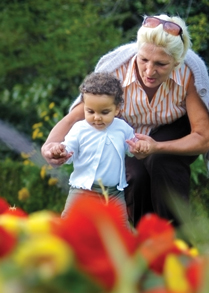A calm parent will help baby with stress of immunizations.
Question:
Our beautiful baby girl is 2-weeks old and we just had our first visit with her pediatrician. She spent lots of time with us and answered all of our questions but I was embarrassed to ask about my biggest worry, which is starting shots. I am scared of shots myself and I hate the idea that she will have to have so much pain. I don’t know what to do. I know the immunizations are important, but I don’t want my baby to suffer. What can I do?
Answer:
First, congratulate yourself about being aware of your feelings and thinking ahead so that you can help your baby get through her immunizations with the least possible stress. Many parents have the same worries that you are expressing and don’t know that they have the ability to help their babies and toddlers avoid the fear of “shots” that is so common in older children and adults.
The good news is that parents, by offering comfort and soothing before and during the immunization process, really can make a difference. Even more good news is that there is excellent medical research supporting the importance of these methods. Even better, using these methods now is the way to prevent your baby from developing the fears that you have expressed.
Here’s how to help your baby:
Plan ahead for your visits by practicing at home how you will help your baby. Babies get the most comfort from parents when they are held in a position of comfort. For younger babies, that will be cradled in your arms. Wrap her in a blanket folded so that you can unwrap her leg or arm for the injection. As babies get older an upright position sitting in your lap facing towards or away from you may be better. If your baby is a wiggler, practice how you can use a blanket to wrap her and help her stay still in your lap rather than placing her on a table. You know already how to comfort your baby, but since you may feel anxious at the visit, practice now how you will take slow, deep and rhythmic breaths while you are
holding her.
A number of studies have shown that breastfeeding your baby beginning a few minutes before an immunization significantly reduces observable pain and stress. There is no evidence that nursing during immunization will cause a baby to choke. Sucking on a pacifier that has been dipped in glucose water (1 teaspoon of sugar mixed in 2 teaspoons of water) can be equally effective. Let your baby continue to suck while injections are being given and for a few minutes after. Let your healthcare provider know that you would like to do this so that you can be seated comfortably ahead of time.
Older babies are soothed by watching the movement of a rattle or seeing and listening to a musical toy, so take a few with you to help her feel relaxed before and distracted during the immunization. Practice at home how you will wrap your baby with one arm to hold her while holding a toy with the other (or enlist someone else to help — this is a great job for an older sibling!) And of course, many parents find that smartphone screens and music will focus a baby’s attention for a few minutes.
As important as the way you hold and comfort your baby is the way you take care of yourself. You know, of course, that you will help your baby the most by staying focused on her needs and letting go of your own fears. Your state of calm is the single best way to shape your baby’s experience during any stressful experience. Before you go into the pediatric office, take some time to practice deep breathing and visualize yourself cuddling and holding your baby when she needs you. You will be going through this experience on every well-baby visit, so taking measures to manage your own feelings well is key.
Most pediatric office will be supportive of your desire to minimize your baby’s discomfort. The suggestions here may already be standard practice. However, you may have to politely explain your approach and occasionally you might be told that there is not time or space to offer your baby this type of comfort. You may have to advocate for your baby and explain that the extra time needed to prepare and soothe a baby now will be more than made up for in the months and years to come when your child is cooperative with other immunizations and procedures. In fact, most public health officials agree that a serious barrier to adult immunizations is the fear of “getting shots” that dates back to early childhood.
Even if your baby cries during the immunizations, remember that her experience of being cared for by her parent while she is unhappy is one of the ways she learns about love.
MEG ZWEIBACK, R.N., M.P.H., PEDIATRIC NURSE PRACTITIONER
Our beautiful baby girl is 2-weeks old and we just had our first visit with her pediatrician. She spent lots of time with us and answered all of our questions but I was embarrassed to ask about my biggest worry, which is starting shots. I am scared of shots myself and I hate the idea that she will have to have so much pain. I don’t know what to do. I know the immunizations are important, but I don’t want my baby to suffer. What can I do?
Answer:
First, congratulate yourself about being aware of your feelings and thinking ahead so that you can help your baby get through her immunizations with the least possible stress. Many parents have the same worries that you are expressing and don’t know that they have the ability to help their babies and toddlers avoid the fear of “shots” that is so common in older children and adults.
The good news is that parents, by offering comfort and soothing before and during the immunization process, really can make a difference. Even more good news is that there is excellent medical research supporting the importance of these methods. Even better, using these methods now is the way to prevent your baby from developing the fears that you have expressed.
Here’s how to help your baby:
Plan ahead for your visits by practicing at home how you will help your baby. Babies get the most comfort from parents when they are held in a position of comfort. For younger babies, that will be cradled in your arms. Wrap her in a blanket folded so that you can unwrap her leg or arm for the injection. As babies get older an upright position sitting in your lap facing towards or away from you may be better. If your baby is a wiggler, practice how you can use a blanket to wrap her and help her stay still in your lap rather than placing her on a table. You know already how to comfort your baby, but since you may feel anxious at the visit, practice now how you will take slow, deep and rhythmic breaths while you are
holding her.
A number of studies have shown that breastfeeding your baby beginning a few minutes before an immunization significantly reduces observable pain and stress. There is no evidence that nursing during immunization will cause a baby to choke. Sucking on a pacifier that has been dipped in glucose water (1 teaspoon of sugar mixed in 2 teaspoons of water) can be equally effective. Let your baby continue to suck while injections are being given and for a few minutes after. Let your healthcare provider know that you would like to do this so that you can be seated comfortably ahead of time.
Older babies are soothed by watching the movement of a rattle or seeing and listening to a musical toy, so take a few with you to help her feel relaxed before and distracted during the immunization. Practice at home how you will wrap your baby with one arm to hold her while holding a toy with the other (or enlist someone else to help — this is a great job for an older sibling!) And of course, many parents find that smartphone screens and music will focus a baby’s attention for a few minutes.
As important as the way you hold and comfort your baby is the way you take care of yourself. You know, of course, that you will help your baby the most by staying focused on her needs and letting go of your own fears. Your state of calm is the single best way to shape your baby’s experience during any stressful experience. Before you go into the pediatric office, take some time to practice deep breathing and visualize yourself cuddling and holding your baby when she needs you. You will be going through this experience on every well-baby visit, so taking measures to manage your own feelings well is key.
Most pediatric office will be supportive of your desire to minimize your baby’s discomfort. The suggestions here may already be standard practice. However, you may have to politely explain your approach and occasionally you might be told that there is not time or space to offer your baby this type of comfort. You may have to advocate for your baby and explain that the extra time needed to prepare and soothe a baby now will be more than made up for in the months and years to come when your child is cooperative with other immunizations and procedures. In fact, most public health officials agree that a serious barrier to adult immunizations is the fear of “getting shots” that dates back to early childhood.
Even if your baby cries during the immunizations, remember that her experience of being cared for by her parent while she is unhappy is one of the ways she learns about love.
MEG ZWEIBACK, R.N., M.P.H., PEDIATRIC NURSE PRACTITIONER





 RSS Feed
RSS Feed